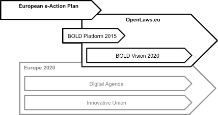1.
Law and Open Data ^
The concept of open data has arrived in the legal domain, meaning that certain data should be freely available to the general public without restrictions. The legal framework for open data is becoming clearer, but there are still uncertainties, in particular with respect to copyright law and privacy aspects of personal data contained in open data (even if one data set as such is anonymous, linked open data may often make it possible to identify a person due to the uniqueness of the profile of such person). There are numerous publications, certainly also due to the revision of the Public Sector Information (PSI) directive in June 2013, which will i.a. bring a genuine right to reuse certain content and lower the upper ceiling for charges to the marginal costs of such content.1
2.
Value of Open Data ^
3.
Legal Information Services ^
3.1.
EUCases ^
3.2.
Neocodex ^
Neocodex is a project of Stanford Law School and the Institute of Law and Technology – Autonomous University of Barcelona. In their paper the initiators describe Neocodex and advocate for the «creation of a federated, hybrid database in the cloud, integrating law data from all available public sources in one single open access system – adding, in the process, relevant meta-data to the indexed documents, including the identification of social and semantic entities and the relationships between them, using linked open data techniques and standards such as RDF.»9 This project will strongly benefit from the open data movement.
3.3.
OKFN Open Legislation Working Group ^
The Open Knowledge Foundation (OKFN) is a non-profit organisation founded in 2004 and dedicated to promoting open data and open content in all their forms – including government data, publicly funded research and public domain cultural content. The Open Legislation Working Group of the OKFN has been recently relaunched with the aim to promote open data in the legal domain and to support the creation of innovative legal ICT projects. During the Open Knowledge Conference 2013 in Geneva, a legal hackathon took place, where several new initiatives were started.10 Everybody is invited to join the mailing list of the OKFN Open Legislation Working Group and to participate in the discussions and projects there.11
3.4.
OpenLaws.eu ^
Illustration 1: Open Innovation in the EU14
3.5.
Conclusion ^
Clemens Wass
- 1 http://ec.europa.eu/digital-agenda/en/news/what-changes-does-revised-psi-directive-bring (15. Januar 2014).
- 2 http://ec.europa.eu/digital-agenda/en/news/economic-analysis-psi-impacts (15. Januar 2014), http://wiki.linkedgov.org/index.php/The_economic_impact_of_open_data (15. Januar 2014).
- 3 Jonathan Gray, OKFN Blog, http://blog.okfn.org/2013/11/05/open-government-should-be-about-accountability-and-social-justice-not-the-digital-economy/ (15. Januar 2014).
- 4 http://www.zillow.com (15. Januar 2014).
- 5 Anderson, Free – The Future of a Radical Price, 2009; free audio book download: https://netzpolitik.org/2009/chris-anderson-free-als-download/ (15. Januar 2014).
- 6 http://www.europeana.eu (15. Januar 2014).
- 7 http://pro.europeana.eu/web/guest/pro-blog/-/blogs/europeana-business-plan-2013-published (15. Januar 2014).
- 8 http://www.eucases.eu (15. Januar 2014).
- 9 Puig, Torrents, The Case for Linking World Law Data, http://ssrn.com/abstract=2371795 (15. Januar 2014).
- 10 http://blog.okfn.org/2013/10/15/open-legislation-working-group-relaunched-at-okcon/ (15. Januar 2014).
- 11 Subscription to the OKFN Open Legislation Mailing List under: http://legislation.okfn.org (15. Januar 2014).
- 12 Wass et al, OPENLAWS.eu, Abstraction and Application, IRIS 2013, Proceedings of the 16th International Legal Informatics Symposiun, p 209; the author is a member of the project consortium.
- 13 http://ec.europa.eu/justice/newsroom/grants/jciv_ag_2013_en.htm (15. Januar 2014).
- 14 EuropeanCommission, About Open Innovation, https://ec.europa.eu/digital-agenda/node/50612 (15. Januar 2014).







